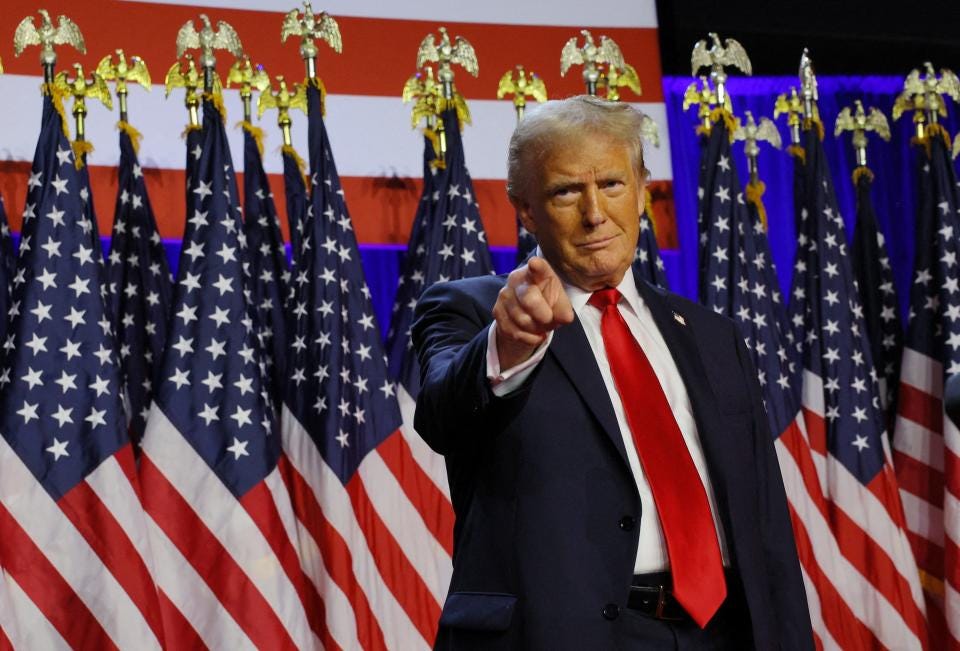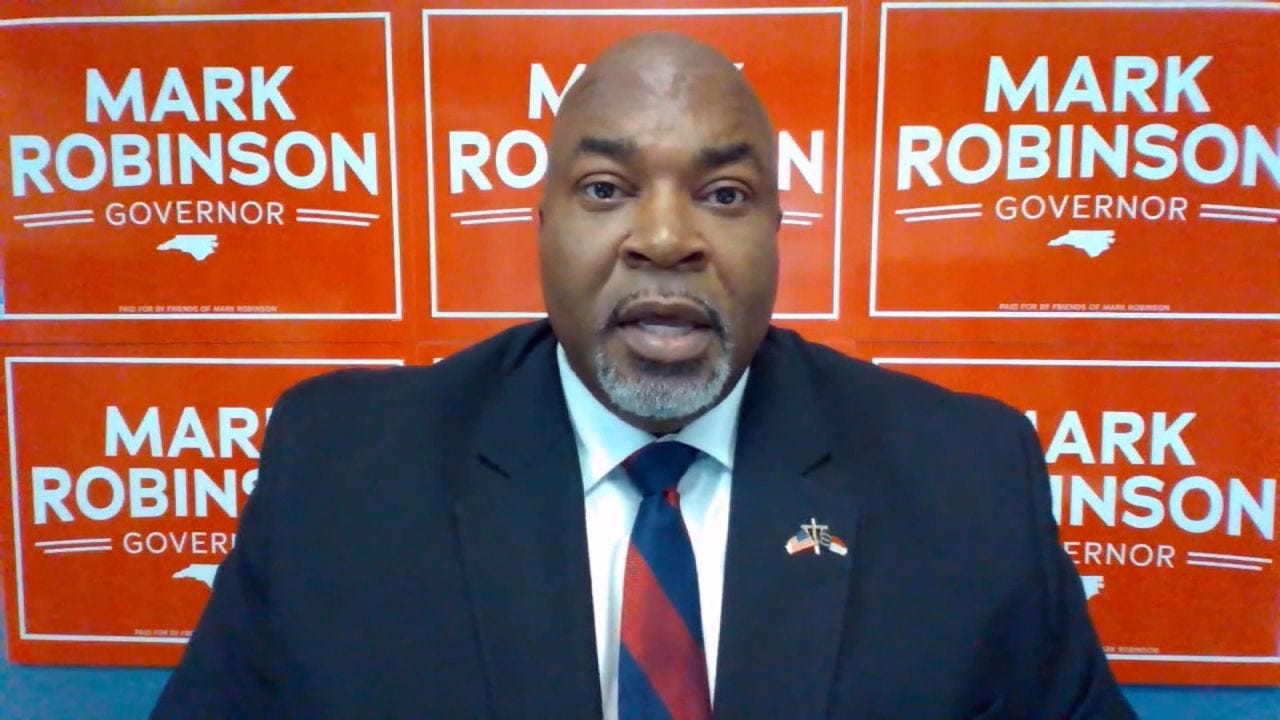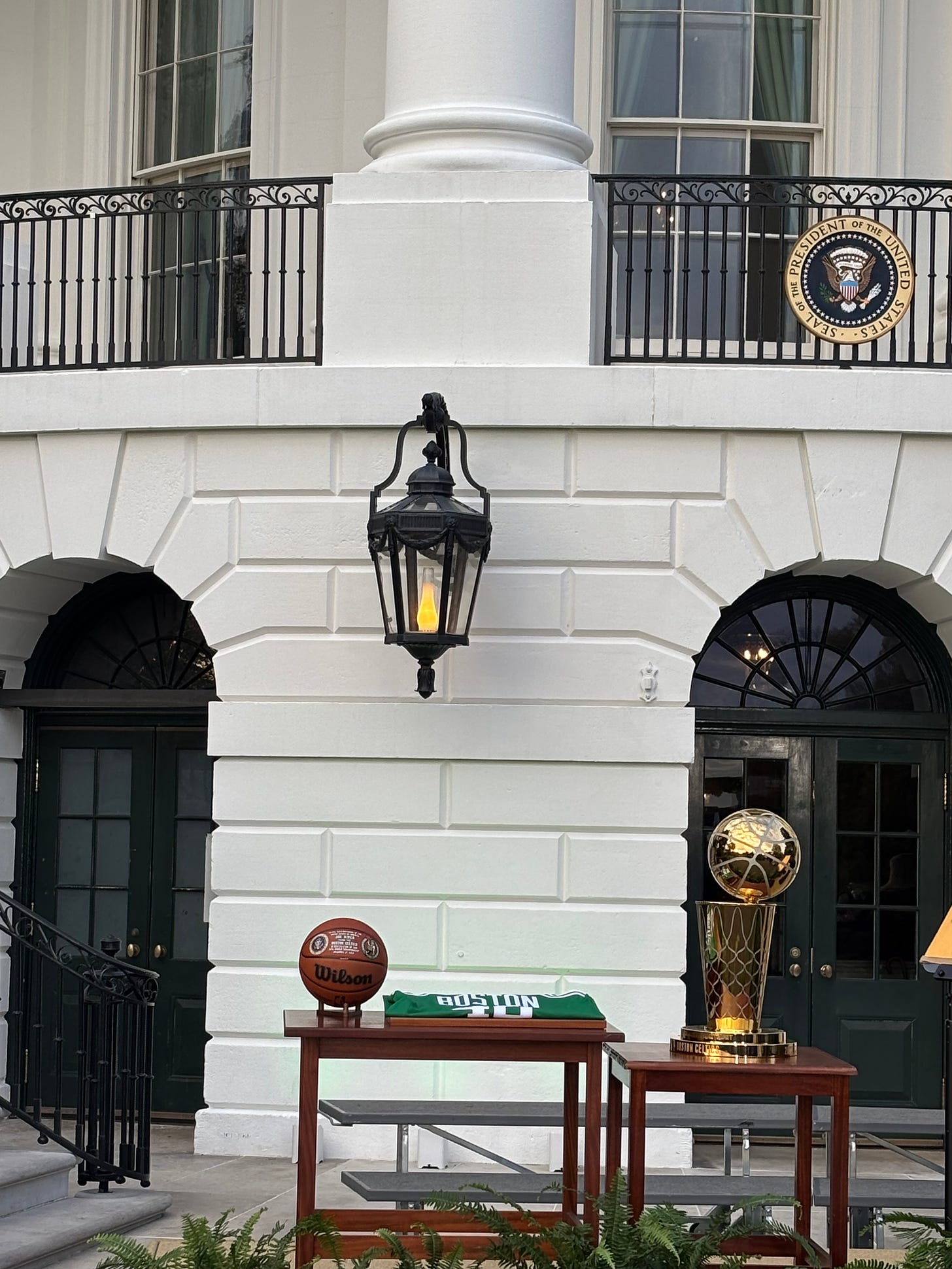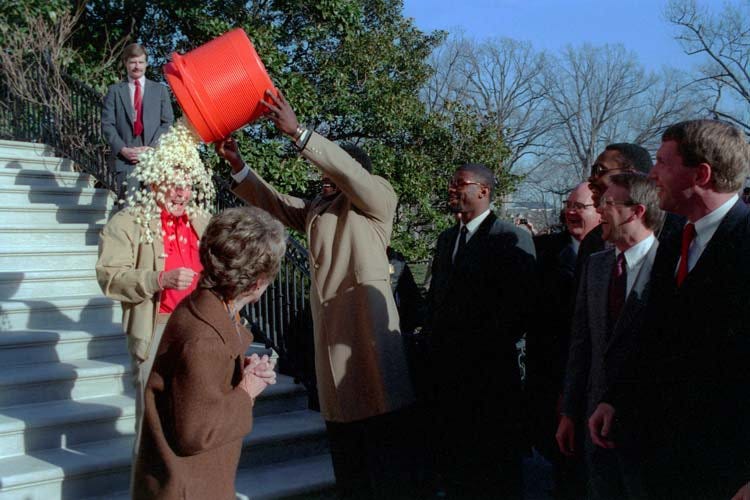In 60 days, Donald Trump will be sworn in as the 47th president of the United States. I will be here bringing you everything you need to know between now and then — and over his four years as president.
If you want to support independent and nonpartisan journalism, I’m your guy. Read more about what I am doing and why I am doing it here. I’d love for you to become a paid subscriber to this newsletter! It’s $6 a month and $60 a year. 👇
1. Debating the Trump mandate
Early in the morning of November 6, I wrote this: “Donald Trump is the next president of the United States, the first chief executive since Grover Cleveland to be elected to two nonconsecutive terms. And he won the office in sweeping and convincing fashion.”
My argument was simple: Trump had won every one of the 7 swing states. He had won over 300 electoral votes and the popular vote as well. He had made significant gains with Latino voters and young men. As I suggested: “It looks to me — and obviously it’s early — like Trump has fundamentally reshaped the two parties’ electoral coalitions.”
And while I didn’t use the “m” word, Trump himself did — in his victory speech very early Wednesday morning: “America has given us an unprecedented and powerful mandate.”
Which is why I read a recent piece written by Charlie Cook, longtime political handicapper and my first boss and mentor in journalism, with real interest.
Charlie’s whole piece — headline: “The Republican Honeymoon May Be Over Before It Begins” — is worth your time. But this is the part that stood out to me:
Self-proclaiming a mandate is a cardinal sin in politics; anyone thinking that voters gave Trump a mandate on Nov. 5 is sadly mistaken. Democrats are understandably shaken and disappointed by Vice President Kamala Harris’s loss, but Trump’s sweep of all seven swing states was hardly a landslide. His victories of 0.9 points in Wisconsin, 1.4 points in Michigan, 1.75 in Pennsylvania, 2.19 in Georgia, 3.1 in Nevada, and 3.32 in North Carolina were impressive yet still within the margin of error for most polls. Only his 5.54-point win in Arizona was worth a raised eyebrow.
Given how few Democrats ended up having problems beneath the presidential race on the ballot, it is clear that the election was a highly focused, targeted repudiation of the Biden-Harris administration. Republicans seem likely to emerge from this election with about 221 or 222 seats in the House, effectively identical to the 221 they held going in, with five seats yet to be decided.
And my old colleague Aaron Blake made a similar case in the Washington Post on Wednesday — noting that Republicans could end up with less seats in the House than they had before the 2024 election. Aaron also noted this:
According to data from the National Conference of State Legislatures (which does yeoman’s work tracking the more than 7,000 state legislative districts), Republicans made only modest gains across the country in the 2024 election….
….Before the election, as of mid-October, Republicans controlled about 55.3 percent of state legislative seats. Their most recent election results, as of Nov. 15, show Republicans bumping that up to about 56 percent.
Which is pretty compelling!
The real question is one of linguistics. What, exactly, constitutes a “political mandate”?
According to Taegen Goddard’s Political Dictionary, “a political mandate refers to the idea that a political official has been elected because the public strongly supports their platforms and wants to see them enacted.”
You’ll notice that there are no specific numbers attached to that definition. As in, no one is saying that to have a political mandate you have to win X number of electoral college votes or Y Senate seats.
In some elections, there’s no mandate debate. In 1994, for example, the massive gains made by House Republicans were clearly a rejection of President Bill Clinton’s first two years in office — and a vote for divided government.
But oftentimes the question of whether a mandate has been achieved is much harder to answer. Take 2012 — where President Barack Obama won 332 electoral votes and a 5 million popular vote margin on the way to a 2nd term.
Some Democrats scrambled to claim a mandate for Obama. The media was more guarded; NPR declared the win a “Vindication, But Not A Mandate.” Even Obama himself seemed to dodge the “mandate” question in a post-election press conference:
With respect to the issue of mandate, I've got one mandate. I've got a mandate to help middle-class families and families that are working hard to try to get into the middle class. That's my mandate.
The mandate then — or at least the decision to describe an election as a mandate — is in the eye of the beholder.
To my mind, the 2024 election WAS a clear vote — at the top of the ticket — for what Trump was offering/promising: Securing the border, deporting people here illegally, lowering the cost of basic food items, making America respected in the world again etc.
Charlie came at it from the other side — casting the election as a “highly focused, targeted repudiation of the Biden-Harris administration.” Which I think it was! But I also think a lot of people who didn’t buy what Kamala Harris was selling also voted for Trump because they liked his solutions better!
And this finding from the 2024 exit poll seems to affirm — for me at least! — that lots of people voted FOR Trump rather than simply AGAINST Harris:
Of the three quarters of voters who said their vote was “mainly” for their candidate, Trump won by 11!
Then there is the debate about the downballot effects of Trump. Yes, Republicans won Senate control and netted four seats — three of which were in states Trump won easily. But, they didn’t win Senate races in the swing states of Arizona, Nevada, Wisconsin and Michigan. Had Republicans done that — and held 57 Senate seats in 2025 — the mandate debate would be moot. They didn’t.
Is a net gain of four Senate seats (and with it the Senate majority) and keeping the House majority (albeit very narrowly) proof that Trump swept along enough Republican elected officials in his wake? Or evidence that Trump didn’t have the sort of coattails that would constitute a mandate?
I honestly don’t know! Here’s what I DO know: Trump thinks he won a clear mandate — and his Cabinet picks in the 15 days since the election make that abundantly clear.
We probably won’t know until the 2026 midterms whether the public truly wanted what Trump was selling or not.
2. Mark Robinson, exit stage right
You won’t have Mark Robinson to kick around any more!
After his disastrous bid for the governorship of North Carolina — “black NAZI”!!! — Robinson appears to be done with electoral politics.
“That is not on my radar at all,” Robinson said yesterday. “Running for office is not on my radar at all. Certainly not.”
Robinson was elected lieutenant governor in 2020. He did not seek a 2nd term in order to pursue the top job. (A Democrat won the LG race to replace Robinson.)
Robinson announcing he has no plans to run for future elected office is sort of like me announcing that I am not interested in playing in the NBA. Like, no one thought that.
Robinson, following the revelations regarding his online (and offline) sex life, became persona non grata in the Republican party. Despite calling him “Martin Luther King on steroids,” Trump distanced himself from Robinson in the wake of the controversy.
Robinson lost the race — badly — to Josh Stein 55% to 40% even while Trump was winning the state by 3 points.
North Carolina is, once again, shaping up to be a major battleground in 2026. Two-term Sen. Thom Tillis (R) is up for reelection. Tillis won in 2020 49%-47% and Democrats are widely expected to target him in two years time.
He has also been one of a handful of Republican Senators willing to, at times, break from Trump — a position that has led to some speculation that he may draw a MAGA-fied primary challenge or decide not to run for reelection.
Would Robinson be able to resist an open seat Senate race? Republicans have to hope he would.
3. Celtics at the White House
On Thursday afternoon, the NBA champion Boston Celtics visited the White House where they were feted by President Joe Biden.
“I know it wasn't easy...But you put in the work,” Biden told the players. “You clocked one of the greatest seasons ever.”
While championship teams visiting the White House is now de rigeur, it wasn’t always so — as I write in my book “Power Players: Sports, Politics and the American Presidency.”
The first president to formalize the visits was Ronald Reagan in the early 1980s. While Reagan wasn’t much of a sportsman — and barely followed college and professional sports as an adult — the former actor knew the power of an image.
Reagan quickly realized that being surrounded by great athletes — and winners — accrued to his political benefit.
Some of the most iconic moments of Reagan’s presidency came when he interacted with athletes. Who could forget a Gatorade bucket of popcorn dumped on the president’s head by New York Giants linebacker Harry Carson?
Two other fun facts: First, the Celtics were the first NBA team ever to visit the White House when John F. Kennedy hosted them in 1963. Second, Biden revealed to the team today that his Secret Service code name was “Celtic.”
NOTABLE QUOTABLE
“Good on him to recognize that and be self aware” — Wyoming Sen. Cynthia Lummis praising (I think) Matt Gaetz for dropping his bid to be Attorney General. He’s self aware at least!
ONE GOOD CHART
Know who Donald Trump’s victory has been VERY good for? Bitcoin owners. Bitcoin topped $98,000 for a time on Thursday before settling just under that mark. It has surged more than 40% in value since Trump won on November 5.
SONG OF THE DAY
In less than 5 hours, the much-anticipated new album from Father John Misty — “Mahashmashana” — comes out. And if the early reviews are any indication, it’s going to make a lot of “best of 2024” lists. (Pitchfork gave it an 8.3!) My favorite song off the new album — and FJM has only released 3 of the 8 songs — is “I Guess Time Just Makes Fools Of Us All.”
Thanks for reading! This nightly newsletter brings you ALL of what you need to know from the world of politics. Think of it as a daily cheat sheet! If you want to get it in your email inbox every night at 7:30 pm, become a subscriber today!










I wrote in your "CHRIS CRUCIAL" column yesterday...it's still pertinent here too.
The FACT is that the majority of voters did NOT vote for Trump.
The FACT is that only one Republican in the past NINE presidential elections, since 1992, has gotten a majority of the votes.
The past THREE winning Democratic elections, the Dems DID get a majority of votes.
In this election, the three critical states, PA, MI & WI, Trump won by only a collective 242,580 out of 153 MILLION cast nationwide.
He loses all those (which he did in 2020), he does not win.
THAT is not a "mandate" of any sort.
The FACT is that President Biden and President Obama (twice) did a LOT better than Trump's narrow win.
Did not see any GOPer's respecting their CLEAR mandates.
In FACT, President Obama not only did not get ANY "honeymoon", the day of his inauguration in 2009, Mitch McConnell met with the GOP caucus and hatched the plan that they would OPPOSE ANYTHING and EVERYTHING President Obama wanted to get done for the American people with his very clear and convincing mandate...
52.9% vs McCain's 45.7%. A huge 7.2 point win. 365 EC votes vs 173.
Trump has NO "mandate" and absolutely deserves NO honeymoon.
His clown car of dangerously incompetent cranks and charlatans for his cabinet and other critical jobs must be STRONGLY OPPOSED!!!
A mandate to do what exactly? Reduce the price of eggs? Lower the cost of home mortgages? Or breach the constitution by sending armed military into blue states?
Elections have consequences. It doesn’t empower Presidents to break the law.
This old mandate thing is such a media buzzword implying that Trump is now entitled to wreak vengeance on his enemies like a Roman. Nope lol.
If he doesn’t want national chaos for 4 years he should behave himself.